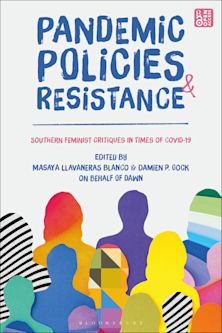- Home
- ACADEMIC
- International Development
- Health and Development
- Communicating during Humanitarian Medical Crises
Communicating during Humanitarian Medical Crises
The Consequences of Silence or “Témoignage”
Communicating during Humanitarian Medical Crises
The Consequences of Silence or “Témoignage”
This product is usually dispatched within 1 week
- Delivery and returns info
-
Free US delivery on orders $35 or over
You must sign in to add this item to your wishlist. Please sign in or create an account
Description
The Promise and Perils of " Silence" or " Temoignage" During Humanitarian Crises provides readers with a nuanced study of what happens when historical and 21st century medical humanitarian communities, armed with their idealistic rhetorics, choose whether to speak out or remain silent during various military or medical crises. The author uses a series of case studies from the late nineteenth century to the early twenty-first century to illustrate the politicized nature of these decisions. Unlike some that focus on the prescriptive need to follow certain universal medical humanitarian principles during crises, this book highlights the precarious nature of what some scholars call “medical advocacy/witnessing” or what the French call “témoignage.”
The author argues that regardless of whether we are talking about lack of action during colonial crises or the Holocaust, it is oftentimes the lack of political will that determines how like “neutrality” or “impartiality” are interpreted. The book also acquaints readers with some of the challenges that have been recently posed to the “new” humanitarian Doctors Without Borders personnel, who have witnessed the targeting of medical hospitals and clinics. What researchers call the weaponization of medical care affects many in need living in places like Afghanistan, Iraq, Yemen, or Syria.
The author concludes the book by underscoring the point that it is the
presence or absence of political will, and not the inherent epistemic value of medical humanitarian principles, that dictates when this advocacy succeeds or fails.
Table of Contents
Chapter 2: The International Committee of the Red Cross, Swiss Nationalism, and Debates over Holocaust Silences
Chapter 3: The Nigeria-Biafra War and Promotion of the Principle of Témoignage by Médecins Sans Frontières
Chapter 4: The 1984-1986 Ethiopian Famine, Relocations, and Ouster of MSF from Famine Relief Efforts
Chapter 5: The MSF 2014 Warnings About the Advent of the “West African” Ebola Epidemic
Chapter 6: Tèmoignage, the 2015 Kunduz Bombing Incident, and Allegations of “War Crimes”
Chapter 7: Counterterrorism and the “Weaponization” of Medical Humanitarianism During the 21st Century
Product details
| Published | Mar 18 2019 |
|---|---|
| Format | Hardback |
| Edition | 1st |
| Extent | 306 |
| ISBN | 9781498593182 |
| Imprint | Lexington Books |
| Dimensions | 9 x 6 inches |
| Publisher | Bloomsbury Publishing |
About the contributors
Reviews
-
Whether they are in Syria, Venezuela, or Liberia, world humanitarian crises that put extensive populations at risk are often understood as mediated (if not ameliorated) by organizations such as Doctors without Borders or the Red Cross. Indeed, understanding the depth of such crises may often come from the statements and information shared by such organizations, which are customarily seen as on-site, objective, and expert. However, Hasian contends that these organizations are not autonomous players but are subject to economic and cultural factors that influence how they testify (the te´moignage of the title) or bear witness to crises. He argues that the political will of these organizations in the face of such factors is what determines if these organizations can offer successful medical advocacy. Hasian's case studies—from Red Cross inaction during the Spanish gas attacks in Morocco in the 1920s to failure of humanitarian organizations to speak out against Western targeting of hospitals in Syria in recent years—reveal how accommodation can undercut political will. A dense read, this book may not necessarily align with coursework in communication or health, but it could be a resource for public health, international studies, and, possibly, public diplomacy. It could also be a valuable research reference for scholars studying cross-cultural communication more broadly.
Summing Up: Recommended. Graduate students, researchers, faculty, and professionals.Choice Reviews
-
Hasian's Communicating during Humanitarian Medical Crises is one of the - if not the - first project on tracking the way that medical humanitarianism functions as a rhetorical enterprise. Employing deft historical analyses of late 19th century to 21st century cases involving 'medical advocacy,' Hasian argues robustly that political will dictates the success of medical efforts, rather than simply humanitarian principles alone. Whether aid groups succeed in their aims depends largely on the presence or absence of their political will. In the process of his smart, original, and watershed examination of rhetorical text in ideological contexts, Hasian reminds us that medical humanitarian work is framed as politicized in and of itself. This is a must-read for those interested in medical humanities, health rhetoric, the rhetoric of science, and ideological discourses of humanitarianism, especially in medical advocacy milieus.
Jason Black, University of North Carolina, Charlotte
-
Hasian presents an engrossing tour of the evolution of medical humanitarianism in the 20th and 21st centuries. The twists and turns of neglect, relief and weaponization are highlighted--illustrating the power of crisis to manifest multiple rhetorical formations for both the good and ill of those most vulnerable.
Stephanie Houston Grey, Louisiana State University


































